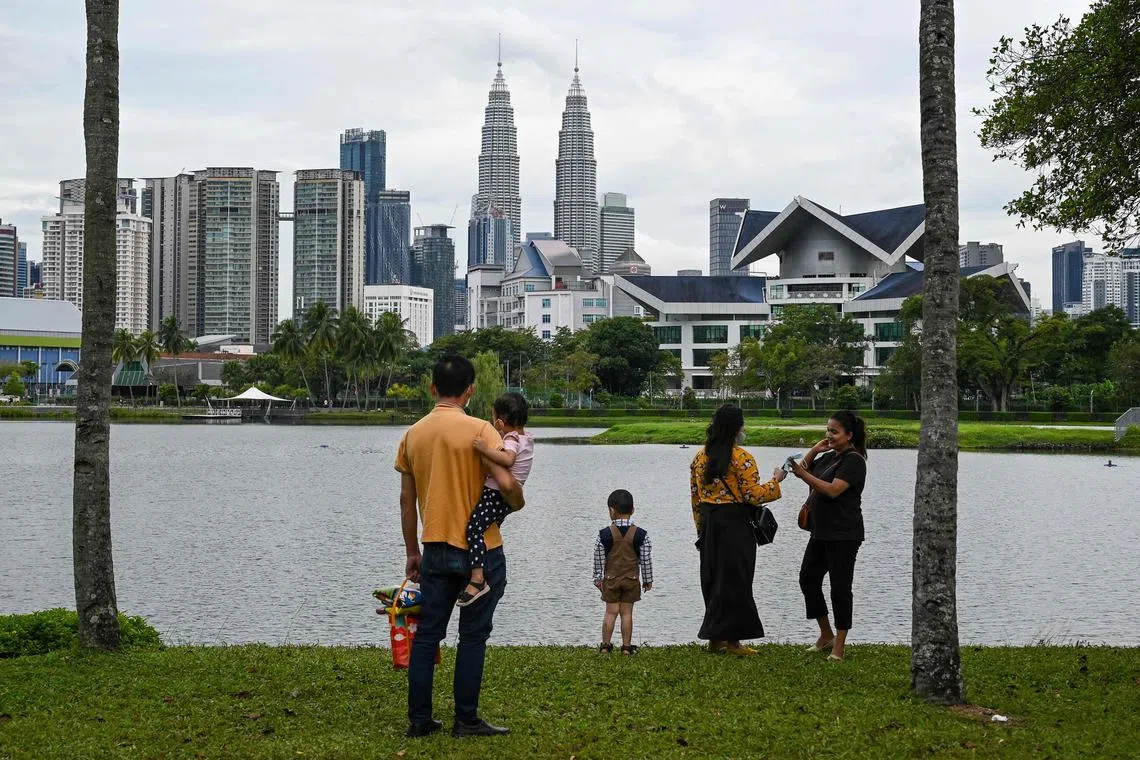Malaysia to allow automatic citizenship for children born overseas to Malaysian mums
Sign up now: Get insights on the biggest stories in Malaysia

Currently, only children born overseas to Malaysian dads are granted Malaysian citizenship automatically.
PHOTO: AFP
Follow topic:
KUALA LUMPUR - Malaysia’s Cabinet has agreed to amend the Federal Constitution to enable children born overseas to Malaysian mothers, who are married to foreigners, to automatically become citizens.
The proposed amendment, which will be tabled in Parliament, is in line with the stand of the unity government – led by Prime Minister Anwar Ibrahim – on fair rights between men and women.
After decades of debate, the Cabinet on Saturday announced its decision to move towards gender equality regarding citizenship for children.
Currently, only children born overseas to Malaysian dads are granted citizenship automatically. A Malaysian woman with a foreign spouse who gives birth outside of Malaysia would not be able to automatically pass on her citizenship to her children.
Children born overseas to Singaporean mums or dads are not granted Singaporean citizenship automatically. If the mother or father is a Singapore citizen by birth, an application can be made for the child to acquire citizenship. If the mother or father is a citizen by registration, application for citizenship is restricted to children who have not acquired citizenship of the country in which they were born.
Malaysia’s proposed constitutional amendments will have a big impact on the Home Ministry as it receives many applications related to citizenship issues, said Home Minister Saifuddin Nasution on Saturday.
Earlier in the day, in a joint statement issued by him and Minister-in-charge of Law and Institutional Reform Azalina Othman Said, the government pledged to “eradicate discrimination against women in Malaysia and overcome the shortcomings of citizenship provisions”.
“The government is committed to resolve the backlog of cases for affected women who apply for citizenship for their children,” they said, adding that registration took “too long” and was “unreasonable”.
The proposed amendment to the Federal Constitution would replace the word “father” with the words “at least one of his parents”, they noted.
There is no mention of “mothers” in the Federal Constitution. The provisions in Malaysia’s citizenship laws mention only the right of fathers to automatically pass their citizenship to their children.
The proposed amendment is expected to be tabled in the current Parliament session, which ends on March 30, said the two ministers.
For the amendment to pass, the backing of at least two-thirds of lawmakers is required. This means 148 MPs out of 222 must allow Mr Anwar’s government to table the constitutional amendment.
Currently, the government has the backing of 148 MPs, and this could be the first legislation to test the Prime Minister’s supermajority in Parliament.
Other amendments to citizenship laws will also be studied by a committee formed under the Home Ministry, and presented to the Cabinet.
Calling the current policy a “sexist law”, freelance journalist Tehmina Kaoosji, who was born in India to a Malaysian mother and an Indian father, has been waiting for decades for the constitutional amendment. She has been residing in Malaysia for 28 years.
She said the proposed amendment would allow Malaysia to realise its full human potential as it has the second highest per capita female migration rate in Asean.
“It is 2023 and about time to break this cycle of discrimination and suffering for Malaysian women and their families once and for all,” Ms Tehmina said.
A high-ranking doctor in a government hospital, who did not want to be named, has been fighting an uphill battle to have her two daughters aged 12 and 14 years old become Malaysian citizens, after her Australian husband died three months ago.
“I had brought back my two daughters from Australia and now in my own country, my children are foreign students. They have to renew their student visa yearly which costs about RM1,700 (S$513) each, inclusive of medical insurance. My hope is that my children can get their Malaysian citizenship so they can be treated like their fellow Malaysian classmates,” the doctor told The Sunday Times.
Malaysia is one of only 22 countries in the world to retain unequal citizenship laws affecting mothers. It is also one of only two such countries in South-east Asia, the other being Brunei.
In December 2020, a group of Malaysian mothers challenged the discriminatory rules, saying that they breached constitutional equality guarantees. The mothers won before the High Court in September 2021.
But the former government, led by Datuk Seri Ismail Sabri Yaakob, appealed against the landmark ruling that equalised the rights of Malaysian mothers and fathers, arguing that the rules were in line with the Constitution. The government appeal was heavily criticised by civil society organisations and one Cabinet member.
In 2020, the Home Ministry argued in Parliament that the unequal citizenship law was a matter of “national security” aimed at preventing overseas-born children from gaining double citizenship, based on the assumption that children would be getting their father’s citizenship.


